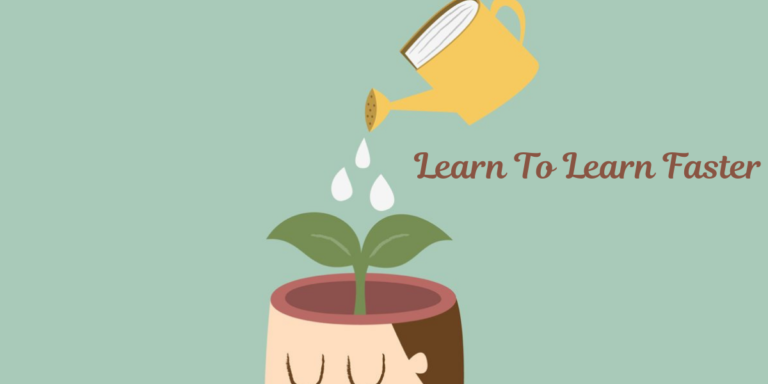In today’s fast-paced world, the ability to learn quickly is a vital skill, whether you’re a student, professional, or lifelong learner. The concept of “learning to learn faster” has become a popular topic in educational psychology, neuroscience, and self-improvement circles. But how exactly can you optimize your brain to absorb information at a quicker pace? This article will explore the most effective strategies and techniques to help you learn faster and retain information more effectively.
We will dive into scientific research, expert recommendations, and actionable tips, all backed by the latest findings in the world of education. If you’re ready to boost your learning efficiency, keep reading.
What Does It Mean to “Learn to Learn Faster”?
Learning to learn faster means improving your cognitive abilities to absorb, process, and recall information more efficiently. It is not about rushing through tasks but optimizing how you approach learning. It involves mastering techniques such as time management, active recall, spaced repetition, and mental organization that align with how our brains naturally work.
The goal is to harness your cognitive resources in the most effective way possible. By learning how to learn faster, you not only enhance your ability to acquire new knowledge but also improve your problem-solving skills and critical thinking. Let’s break down some of the best strategies for achieving this.
Optimize Your Environment
Your learning environment plays a significant role in how fast you can absorb information. The right setting reduces distractions and enhances focus, which in turn boosts learning speed. Here are some tips to create an environment conducive to faster learning:
- Quiet and Organized Space: A clutter-free environment encourages concentration. Make sure you have all the materials you need, including notebooks, pens, and resources, within easy reach.
- Minimal Distractions: Turn off notifications on your phone or computer. Use apps like “Focus” or “Forest” to limit distractions while you study.
- Proper Lighting: Natural light is ideal, but if that’s not possible, ensure your workspace is well-lit to avoid eye strain and fatigue.
- Comfortable Seating: An ergonomic chair and desk setup can significantly reduce discomfort, allowing you to focus longer without physical distractions.
- Use Active Recall
One of the most effective techniques to enhance learning speed is active recall. This method involves actively testing your knowledge by trying to retrieve information from memory, instead of simply re-reading notes. Active recall strengthens neural connections and improves long-term retention.
- Practice Quizzes: After studying a topic, quiz yourself on key concepts to reinforce your understanding.
- Flashcards: Create flashcards with questions on one side and answers on the other. Apps like Anki or Quizlet can help you create digital flashcards that use spaced repetition, another technique for learning faster.
- Teach What You’ve Learned: One of the best ways to solidify information is by explaining it to someone else. Try teaching a friend, family member, or even your pet!
- Implement Spaced Repetition
Spaced repetition is a scientifically backed technique that involves reviewing information at increasing intervals over time. This method prevents the forgetting curve and helps to reinforce learning.
- Spaced Repetition Software: Tools like Anki and SuperMemo are designed to help you implement this technique effectively by scheduling review sessions based on when you’re likely to forget the material.
- Set Learning Goals: Break down your study sessions into small, manageable chunks and review them periodically. For instance, review material after one hour, one day, one week, and one month.
- Focus on Understanding, Not Memorizing
Memorization can be useful for some subjects, but focusing solely on rote memorization can slow down your learning. Instead, strive to understand the underlying concepts and principles behind the material.
- Active Note-Taking: Instead of just writing down everything you hear, engage with the material. Use the Cornell method of note-taking or concept maps to visually represent how ideas are connected.
- Connect New Knowledge to Existing Knowledge: Relating new information to something you already know creates a network of knowledge that is easier to recall.
- Utilize the Pomodoro Technique
The Pomodoro Technique is a time management method that encourages focused work sessions followed by short breaks. This technique can improve focus, prevent burnout, and make your study time more efficient.
- Work in Intervals: Set a timer for 25 minutes and work with full concentration. After the timer goes off, take a 5-minute break. After four intervals, take a longer break (15-30 minutes).
- Minimize Mental Fatigue: By working in focused bursts and taking regular breaks, you prevent mental fatigue and keep your cognitive resources fresh.
- Adopt a Growth Mindset
According to psychologist Carol Dweck, those with a growth mindset believe that intelligence can be developed with effort, strategies, and perseverance. This mindset significantly impacts how quickly you can learn because you are more open to challenges and new ideas.
- Embrace Challenges: See difficulties as opportunities to learn, rather than obstacles.
- Learn from Mistakes: Don’t be discouraged by failures. Instead, view them as part of the learning process and analyze what went wrong to improve next time.
- Stay Persistent: Consistent effort leads to mastery. Even if learning feels slow, stick with it, and you’ll see improvements.
- Apply the Feynman Technique
Named after Nobel laureate Richard Feynman, this technique involves explaining a concept in simple language as if you were teaching it to someone else who has no prior knowledge of the subject.
- Break Down Complex Ideas: Simplify difficult concepts into easy-to-understand language. This process reveals gaps in your understanding and helps reinforce learning.
- Use Analogies: Analogies make complex ideas more relatable. Try to explain abstract concepts using examples from everyday life.
- Get Adequate Sleep
Sleep is a crucial component of memory consolidation. Studies have shown that people who sleep after learning a new task are better at recalling information. Lack of sleep impairs cognitive function and slows down the learning process.
- Sleep and Memory: Aim for 7-9 hours of sleep each night, especially after intense learning sessions, to help consolidate memories.
- Power Naps: A short 20-minute nap can enhance cognitive function and improve alertness, allowing for more effective learning.
- Nourish Your Brain with Proper Nutrition
Your brain needs fuel to function efficiently. Eating a well-balanced diet rich in nutrients can improve your cognitive function and learning speed.
- Omega-3 Fatty Acids: Found in fatty fish like salmon, omega-3s are known to boost brain function and memory.
- Antioxidants: Blueberries, dark chocolate, and green leafy vegetables protect your brain from oxidative stress, improving memory and concentration.
- Hydration: Dehydration can negatively impact brain function. Make sure to drink enough water throughout the day.
- Stay Consistent and Patient
Finally, consistency is key when it comes to learning faster. Consistent practice, small improvements, and regular reflection will yield significant results over time. Remember that speed should not come at the expense of comprehension.
- Set Daily Goals: Aim to learn something new each day, even if it’s just a small piece of information.
- Track Your Progress: Keep a journal or use an app to track your learning progress and reflect on what works best for you.
Comparison Chart: Learning Strategies at a Glance
| Strategy | Description | Benefits | Tools & Resources |
| Active Recall | Testing yourself to retrieve information from memory. | Improves memory retention and recall speed. | Flashcards (Anki, Quizlet) |
| Spaced Repetition | Reviewing information at increasing intervals. | Prevents forgetting and strengthens memory. | Anki, SuperMemo |
| Pomodoro Technique | Work in short bursts with frequent breaks. | Prevents burnout, improves focus. | Focus apps, Pomodoro timers |
| Feynman Technique | Explaining concepts in simple terms to identify knowledge gaps. | Deepens understanding and retention. | None (just pen and paper) |
| Growth Mindset | Belief in the ability to improve intelligence with effort. | Increases resilience and learning speed. | Mindset books (e.g., Carol Dweck’s “Mindset”) |
| Proper Sleep | Ensuring sufficient rest to aid memory consolidation. | Enhances learning and memory. | Sleep trackers (e.g., Sleep Cycle) |
| Nutritional Support | Eating brain-boosting foods to fuel cognitive function. | Improves brain health and focus. | Omega-3 supplements, healthy foods |
| Consistency | Regular practice and steady learning habits. | Long-term improvements in learning speed. | Habit tracking apps (e.g., Habitica) |
Conclusion: Learn to Learn Faster
Learning to learn faster is not just about increasing speed; it’s about working smarter, not harder. By optimizing your environment, using scientifically proven techniques like active recall and spaced repetition, and maintaining a healthy mind and body, you can significantly improve your learning efficiency. Remember that consistent practice and a positive mindset are key to long-term success.
The strategies in this article can help you unlock your potential and master the art of learning faster. Start incorporating them into your study or work routine today, and you’ll see tangible improvements in your ability to learn and retain new information.

